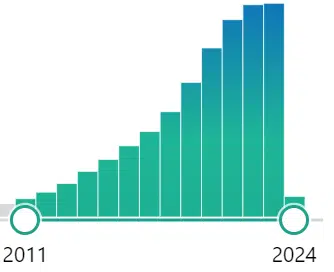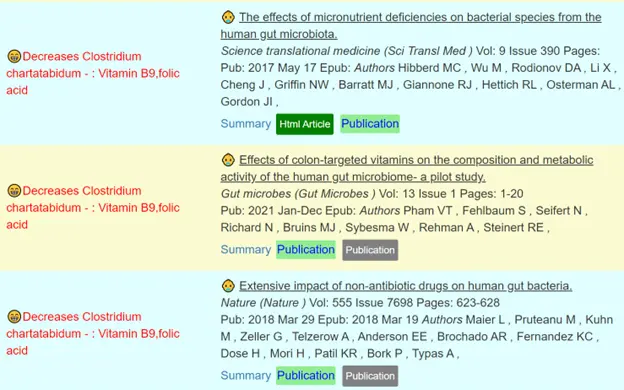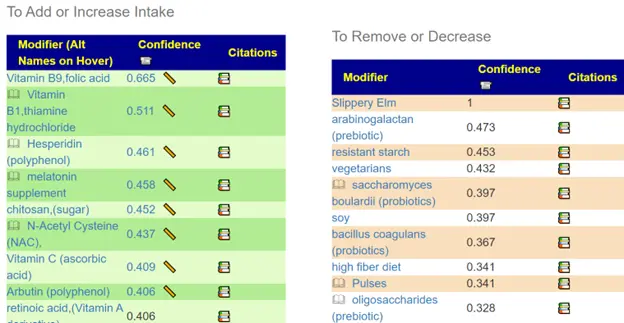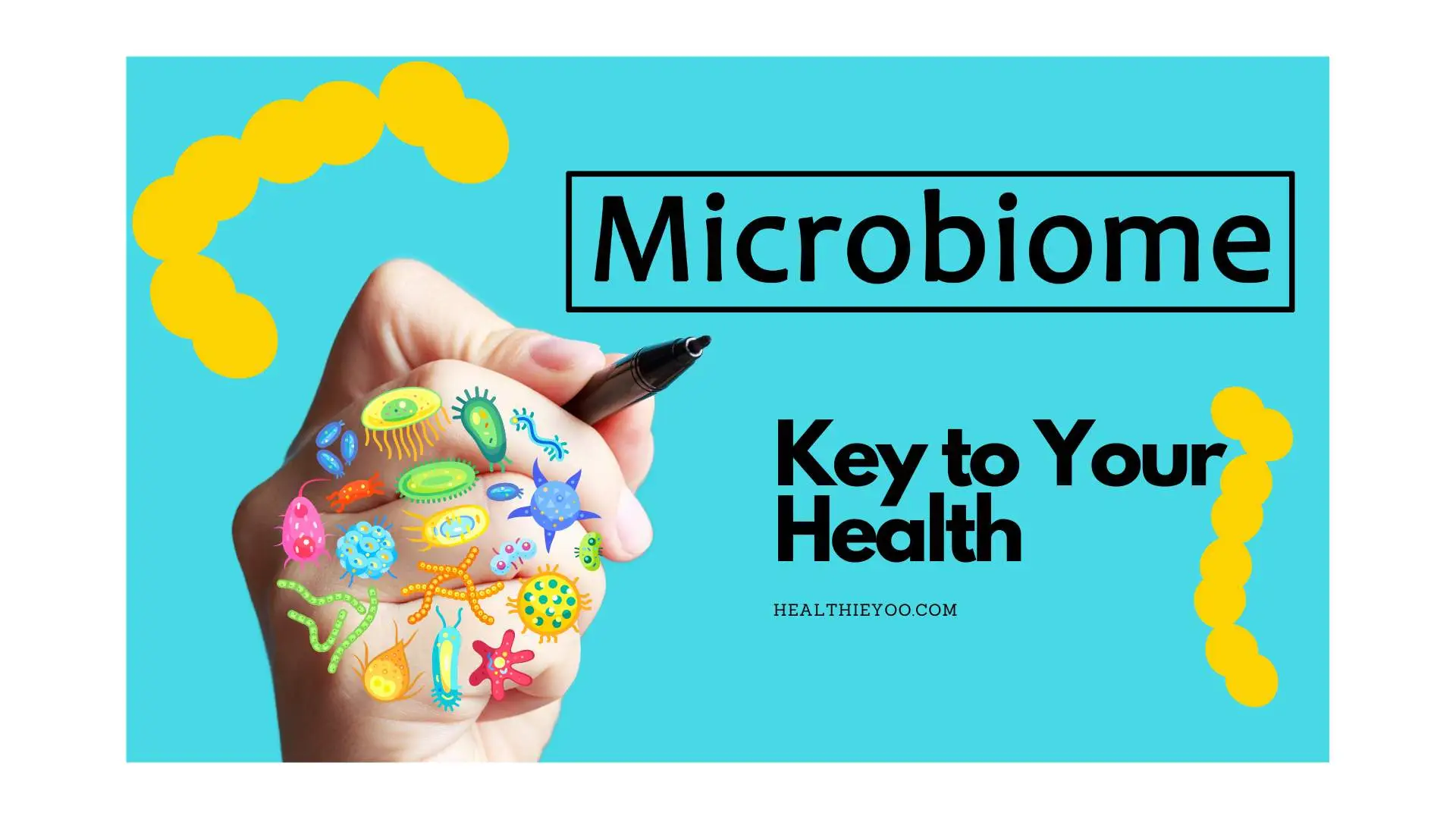The microbiome (gut bacteria) shows strong connections to many health conditions, with over 100 identified in published studies by the US National Library of Medicine (1). Over 280 symptoms have been identified from private studies (2). Many of these are obvious, for example: Inflammatory Bowel Disease, Irritable Bowel Syndrome, and Constipation; some are less obvious such as:
- Age-Related Macular Degeneration and Glaucoma
- Allergic Rhinitis (Hay Fever)
- Alopecia (Hair Loss)
- Alzheimer’s disease
- Bipolar Disorder
- Brain Fog
- Chronic Urticaria (Hives)
- Myalgic encephalomyelitis/chronic fatigue syndrome
- Postural orthostatic tachycardia syndrome
- Fibromyalgia
- Hot or Cold spells
- Long COVID
The microbiome is one of the easiest corrected factors for these conditions, much easier than DNA, and objectively measurable. The term dysbiosis means that the gut bacteria are shifted from optimal.
Correcting this dysbiosis may be done by supplements, probiotics, diet choices, and prescription drugs. The correction should not be done by arbitrarily trying changes and seeing what happens. The appropriate approach is to work from knowledge of your own microbiome and use all of the available data for each abnormality. There is a massive amount of information available in studies; this information should be used. This is not an instant cure, but the beginning of a long trek.
There is a free citizen science site, Microbiome Prescription (3), that has assembled this data with links to over 10,000 studies from the US National Library of Medicine site (4). This far exceeds every commercial site offering advice and is free.
The Human Microbiome Is Big
There are over 29,000 different bacteria reported on some microbiome tests. Many are rare bacteria in small amounts – but some appear to have a major impact. Most people know about Lactobacillus and Bifidobacterium. These are referred to as Genus. There are over 4300 different genera often seen in the human microbiome (there are over 100,000 genera in total). Focusing on Lactobacillus and Bifidobacterium while ignoring the others often results in frustration because there may be little change in symptoms by trying to alter them with probiotics and fermented foods.
The microbiome very rarely has any bad or good bacteria. The bacteria in the microbiome should be viewed as Yin-Yang; a balance that has gone off.
To illustrate this a bit more, the following conditions are reported to have both Lactobacillus and Bifidobacterium being high from studies on the US National Library of Medicine site (4), not in every study but several studies for each.
- Amyotrophic lateral sclerosis (ALS) Motor Neuron
- Atherosclerosis
- Atrial fibrillation
- Autism
- Crohn’s Disease
- Depression
- Graves’ disease
- Hypertension (High Blood Pressure
- Inflammatory Bowel Disease
- Irritable Bowel Syndrome
- Juvenile idiopathic arthritis
- Liver Cirrhosis
- Long COVID
- Metabolic Syndrome
- Myalgic encephalomyelitis/chronic fatigue syndrome
- Mood Disorders
- Multiple Sclerosis
- Obesity
- Parkinson’s Disease
- Psoriasis
- Rheumatoid arthritis (RA)
- Schizophrenia
- Stress / posttraumatic stress disorder
- Type 2 Diabetes
- Ulcerative colitis
A naïve conclusion would be that Lactobacillus and Bifidobacterium are bad bacteria. In the above cases, they are not limited to healthy levels by other bacteria.
How do you find out what is in your Microbiome?
The Microbiome Prescription site (3) does not sell tests. It supports the importing of data from over 30 different testing companies. The preferred test results are from:
- Thorne Gut test (5)– it reports bacteria, viruses, and fungi in the gut. It is the most detailed of easily available tests $198 US. Not available worldwide.
- Biomesight (6) – reports bacteria only $199 US. Available worldwide.
- Ombre Labs (7) – reports bacteria only $119.99 US. Not available worldwide.
Other tests that are often advocated by some medical professionals often lack effective details. They focus on specific bacteria that were often associated with conditions based on literature from the last millennium. The table below illustrates the differences between tests.
Test Name | Average types of bacteria reported | Some samples report |
Thorne Gut test | 2785 | 5618 |
Biomesight | 605 | 1570 |
Ombre Labs | 688 | 1566 |
GI Map | 62 | 62 |
GI Effect | 69 | 69 |
For microbiome testing, we have the same situation as with prescription drugs – the company that spends most on marketing and conference presentations for medical professionals. This is compounded by medical professionals being well conditioned to “standard of care”, that is, keeping treatment to the “official and approved cookbook recipes”. A classic example is Peptic ulcer disease (8) which was recognized as being caused by a bacterium by John Lykoudis in 1958 and could be treated with antibiotics. It was not until 1997 that the Centers for Disease Control and Prevention launched a national education campaign to inform healthcare providers and consumers about the link between H. pylori and ulcers. For over 40 years, medical professionals would tell patients it was caused by stress.
Microbiome dysbiosis is too complex to address with a “one recipe from the cookbook” attitude.
Acting on your Information
People will often take the results to their medical practitioners and are meet with either blank stares or reasons to discount the data (despite the data coming from certified laboratories). The reasons are simple:
- They were never trained in using microbiome data,
- They are not current on microbiome data beyond helicobacter pylori causing peptic ulcers.
- Microbiome dysbiosis does not have a prescription drug shown to correct it.
Information on the microbiome is exploding. The chart below shows the number of studies published yearly over the last few years. In 2011, there were 1,822; in 2023 we have 27,539.

It is unrealistic for a health professional to read (and remember) 27,000 articles a year. The Microbiome Prescription site uses Artificial Intelligence techniques to identify the most significant studies for manual review and data transcription to its database (typically 5,000 studies/ year). Its database has 2.5 million facts on modifying different bacteria which is constantly growing.
Selecting Your Information Source
The Microbiome Prescription site is just one of many sites that will offer advice on the web. Many sites are connected to testing companies or/and will try to up-sell you on the products they sell. You are free to pick any information source.
The Microbiome Prescription site provides links to all the evidence it uses to make suggestions and why. This evidence trail shows the impact of each bacterium in dysbiosis, the supplement, and the literature used to make recommendations (with direct links). You should ask any information site to provide equivalent information for their suggestions. Often their basis is old studies (since found to be incorrect), or “common sense wisdom” or “my experience” [a.k.a. trust me].

As stated above, Microbiome Prescription supports over 30 different tests. Most sites do not support analysis of anything except their own tests and many sites do not allow expert of their data from the site.
Prioritizing Suggestions
Often information sites will give a list of suggestions with no indication of which is more important. Frequently, no information is provided on what to avoid. Microbiome Prescription provides prioritized lists. If you want to know why a substance was suggested to take or suggested to be avoided, it is a simple click of 📚 to see the basis and the literature. Often people are surprised and state “I have been told that X is good, and the site says to avoid it!” Influencers suggestions are not personalized to your microbiome and usually assume that every microbiome is the same – they are not. The question should always be asked – are your suggestions specific to me and what evidence do you have to support the suggestions?

Performance of Suggestions?
There is an extensive list of microbiome analysis posts for ME/CFS and Long COVID (9). So far, every person who has done this approach has reported subjective improvement and objective (less dysbiosis in test) on subsequent tests. The suggestions have been cross-validated by using the shifts reported on the US National Library of Medicine site for a condition. The suggestions were checked against clinical studies on the US National Library of Medicine site for the same condition with a successful prediction rate of 92% which suggests that the fuzzy-logic expert system performs far better than random items. See the blog post on the cross-validation of AI Suggestions for Nonalcoholic Fatty Liver Disease (10). The fuzzy-logic expert system has been in use in medicine since the early 1970’s. The first significant one was called MYCIN and was written by Stanford University in 1972 (11). While classified under Artificial Intelligence Software, expert systems are very different than ChatGPT and other Large Language Models that are the current fad.
All suggestions should be reviewed by a knowledgeable medical practitioner before starting. The suggestions are computed using a fuzzy-logic expert system (12) and do not consider the patient’s history or other conditions. Suggestions are not based on clinical experience but on logical inferences from over 2.5 million facts from over 10,000 studies.
Sources
- https://microbiomeprescription.com/Library/PubMedSources
- https://microbiomeprescription.com/Library/CitizenScience2
- https://microbiomeprescription.com/
- https://pubmed.ncbi.nlm.nih.gov/
- https://www.thorne.com/products/dp/gut-health-test
- https://shop.biomesight.com/collections/frontpage/products/gut-microbiome-test-snapshot
- https://www.ombrelab.com/products/ombre-gut-health-test
- https://en.wikipedia.org/wiki/Peptic_ulcer_disease
- https://blog.microbiomeprescription.com/modifying-your-microbiome/analysis-posts-on-long-covid-and-me-cfs/
- https://blog.microbiomeprescription.com/2023/02/12/cross-validation-of-ai-suggestions-for-nonalcoholic-fatty-liver-disease/
- https://www.clinfowiki.org/wiki/index.php/MYCIN
- https://journal.chestnet.org/article/S0012-3692(15)42851-X/fulltext

Ken Lassesen
Related Posts

Ka’Chava Reviews, Ingredients, Side Effects: Elevate Your Nutrition With Superfood Shakes

Provitalize Reviews, Ingredients, Side Effects – Does This Thermogenic Probiotic Work?



Symptoms of SIBO vs IBS, hydrogen vs methane SIBO symptoms and Hydrogen sulfide SIBO


